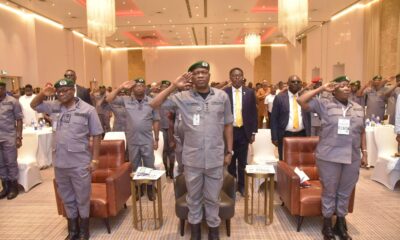Business
‘Customs Creating Unequal Market With 4% FOB Levy’ – Nweke

BY GBOGBOWA GBOWA
Cerebral freight forwarding practitioner, Fwdr Eugene Nweke Rff has faulted the Nigeria Customs Service (NCS) notice for the proposed engagement and sensitization of clearing agents by Customs Area Controllers (CACs) made available yesterday, Wednesday, February 5, 2025 as reactionary and therefore is incompatible with best practices.
The former president of the National Association of Government Freight Forwarder (NAGAFF) said the appropriate step would be to first of all suspend the implementation of new levy while closing the gaps that existed via its hurried roll out; as the insistence would amount to promoting unequal partnership and unequal markets.
While acknowledging the NCS for its notice to carry stakeholders along, he argued that the NCS action appears to be bereft of genuine consideration for clearing agents, since the Service has gone ahead to integrate the contentious levy in its operational platforms.
“I must begin with appreciating the management reactionary response time to critical trade concerns as raised by stakeholders. With a deep sense of responsible partnership and utmost duty and obligation as an industry leader, l understand that consistent and positive public policy advocacy entails engaging authorities constructively for shaping the public enterprises and for the overall interest of the larger populace.
“My take on this particular circular is that, it is yet to meet with the appropriate standard application or undergo thorough administrative due process in line with the international best practices. This is because the circular could not be rated standard as having judiciously gone through the requisite provisions of the section 18 of the customs act 2023.”
He argued that circular appears suspect for failing to carry the necessary endorsements of the proper channels of approvals.
“In particular, no Presidential notifications to the National Assembly nor Presidential approval or consent could be referenced in this regards, except if such process will be backdated and referenced over night.

“Other than directing the area comptrollers to kick start stakeholders engagement, it is administratively appropriate to firstly, suspend the collections of the fee, go back to the drawing board and issue an implementation grace period for the collection of the 4% FCS fee across board.”
The respected freight forwarder lamented that the way and manner the levy is been forced does not reflect mutual partnership respect apart from concerns that the implementation of the levy will throw up unequal market given its suddenness.
“This is so because, a serious unequal trade treatment has been committed, base on operational findings, while the implementation of the 4% fee has been integrated into the Apapa and Tincan command revenue assessment portals, it is same with the PTML command portal.
“This development has caused trade distrusts, distortions and disruptions in financial budgeting of the shippers, as it casts a heavy competition burden amongst the trading public who clears their shipments from customs ports to sell in a common market; one paying the 4% fees and the other not paying.
“The 4% FCS is a legislated fee as enshrined in Part V, Section 18 of the Customs Act 2023 which provides a framework for financing the operations of the NCS. The provisions establish a minimum revenue stream from import duties, user fees, and other sources, while also emphasizing the importance of transparency and accountability in the determination of these fees and regimes. The implications of these provisions are significant, as they affect the revenue generation and operations of the NCS, as well as the broader economy.
‘However, the imposition of a 4% charge on CIF value instead of FOB value by customs is not ideal and professional. The unilateral implementation of the charge without proper notification and circular may lead to delays, congestion, and increased costs, ultimately damaging the reputation of the customs authorities and the industry as a whole. The customs authorities should take immediate action to address this situation and provide clarity on the implementation of the 4% charge.
“Finally, it must be stated that, it amounts to business unfriendly for the NCS to implement 4% FCS fee along side the extant 1% CISS collection. This is because, the FCS charge is meant to finance customs operations and cargo inspection is a component of its operations.
Therefore, collecting the 4% FCS charged on FOB for financing customs operation and at this same time collecting 1% CISS ( Comprehensive Inspection Service Scheme) charged on FOB for cargo inspection handling operation fee is tantamount to high handedness, in the context of the NCS and industry procedural code.”


































